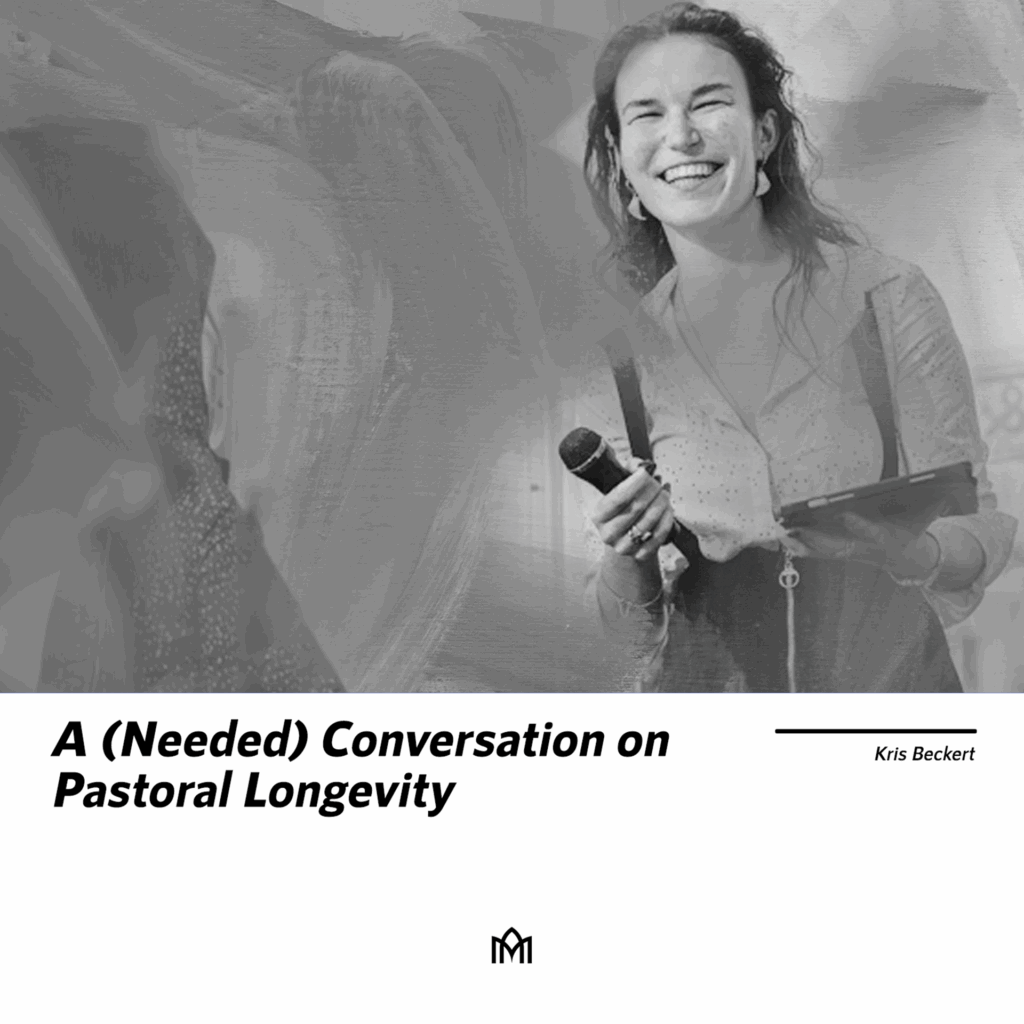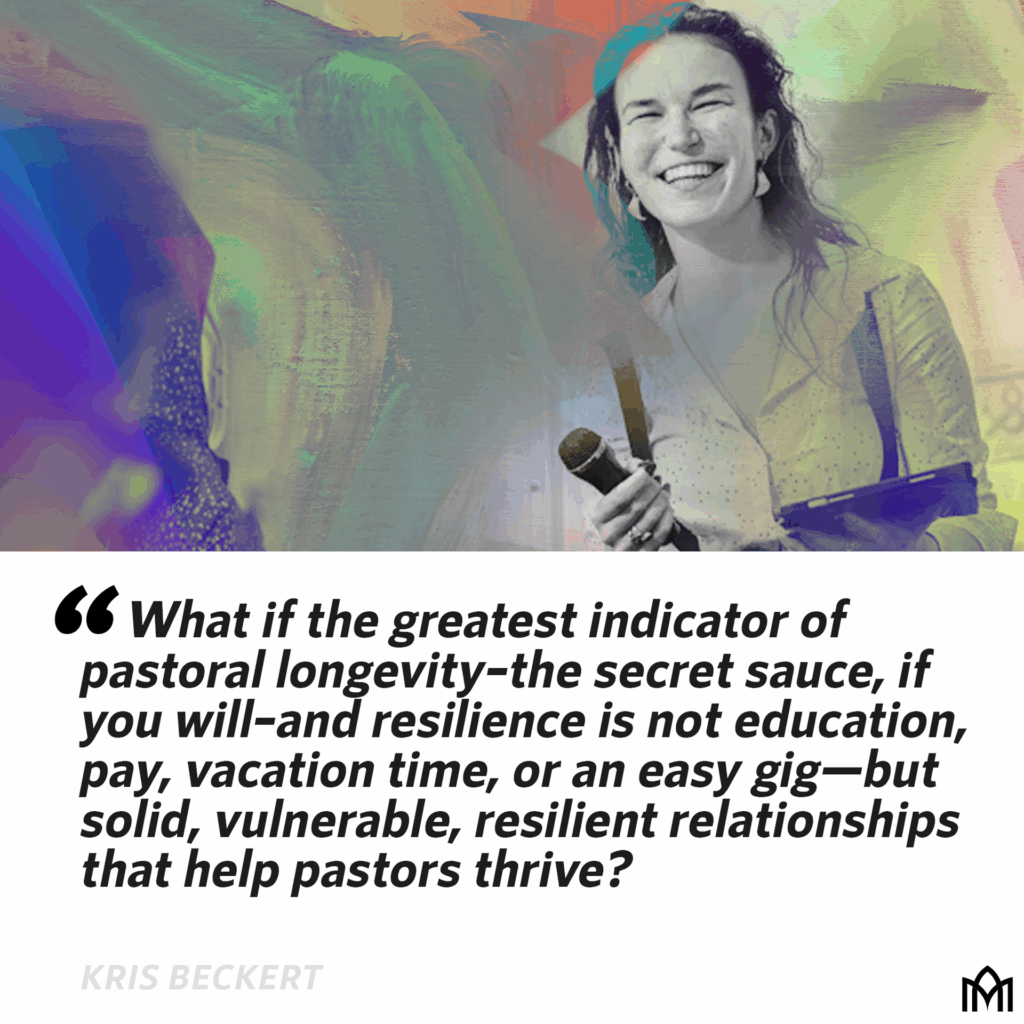A (Needed) Conversation On Pastoral Longevity
*Editorial Note: When Lead Pastor Kris Beckert told me that she wanted to write a piece on pastoral longevity because she realized that none of her seminary friends and colleagues were still in pastoral ministry, just over a decade from their graduation as young, idealistic pastors-in-training, I was intrigued. When she wrote submitted this line, I was hooked: “There is no one reason pastors leave ministry. But there is often one common feeling: Loneliness.” I knew that Kris’ piece, “The Secret Sauce For Pastoral Longevity“ invited deeper reflection and further dialogue. Below, we continue to do just that. ~CK

MISSIO ALLIANCE (MA): You write: “There is no one reason pastors leave ministry. But there is often one common feeling: Loneliness.” The wisdom in this statement is so powerful, and so clarifying! Can you say more about what led to your realization that a common feeling pastors and Christian leaders consistently wrestle with is that of feeling alone?
KRIS BECKERT (KB): Being a pastor or a church leader puts you in a very unique and weird position at the convergence of spiritual, emotional, relational, familial, vocational, and financial ties. This means that you can’t talk to just anyone about anything. For instance, in a small group, members can share about their grievances at work, but if you work in the church, you can’t share about a political conversation with a certain church member or decision to fire a staff member or a recent disagreement with the Board. The place we worship is also the community we are leading, which is also where our kids are learning about Jesus, which also pays our bills each month. In addition, we receive so much information in confidence–about families, marriages, addictions, etc–that it can lead to a feeling of isolation, with no “outlet” to relieve the pressure or heaviness of that information.
I know there are many factors that can lead to pastors turning to affairs or addictive behavior, but I think that sense of loneliness and isolation is a big one. Sometimes we can become willing to do even hurtful, harmful things to ourselves just so we can feel something inside. To our own fault, sometimes we choose to handle things by ourselves, thinking we should be able to do it of our own volition since God has called us to it. Our tendency is to be like Moses, so busy and overworked that we don’t have time or emotional bandwidth for real community or relationship with anyone. All the people in our circles are our “projects” with expectations and needs. We don’t have time to just be with someone and enjoy their company.
MA: I loved this central conclusion from your piece: “What if the greatest indicator of pastoral longevity–the secret sauce, if you will–and resilience is not education, pay, vacation time, or an easy gig—but solid, vulnerable, resilient relationships that help pastors thrive?” Can you speak more personally about how you arrived her in your own pastoral journey? What did you ‘try’ prior to learning this?
KB: I think like most of us, I learned the hard way! Either I was so busy I didn’t make time for real friendships, or all my friends were within the church, which has its own caveats. I always have been an athletic person, which is good for my heath and mental well-being. When I got involved in some local clubs and athletic teams, God introduced friends outside the church to me through my sports and outdoors interests. These were people whom I didn’t know I needed. It was a breath of fresh air to be known as something outside of “Pastor.” These friends know me for me, and many have become lifelong relationships, even through changing churches and locations.
Our tendency is to be like Moses, so busy and overworked that we don't have time or emotional bandwidth for real community or relationship with anyone. All the people in our circles are our ‘projects’ with expectations and needs. Share on X
MA: How do we cultivate long-term relational support and true accountability for the pastoral vocation? You write, “Support isn’t created, especially at a moment’s notice. It’s cultivated.”
KB: Sometimes when I’m in a jam, I make a wish list. “If I only had…Taken that class on trauma, gotten to know her better, learned that program, seen a counselor, etc.” I realize that I needed to put in time and energy in those things BEFORE they would be needed or utilized, because friendships (and relational support in general) need time to mature. Relationships are like a seed we have to plant and tend if we want it to grow and result in fruit. The reason I can text a friend and ask them to pray for me, or to get together for a coffee, is because we have built that kind of relationship over time. I forget who said it, but we all need people in our lives who can come over and open our refrigerator and it’s not weird. But this is a two-way desire: You can’t expect people to be there for you if you’re never there for them either.
It was a breath of fresh air to be known as something outside of 'Pastor.' These friends know me for me, and many have become lifelong relationships, even through changing churches and locations. Share on X
MA: Speak more about the dichotomy between what Western culture values (romantic marriages, often culminating in marriages/families) and what the social sciences are telling us about what human beings need, which are deep friendships. Is there anything we can learn from non-Western, more communal cultures that can lead to greater pastoral longevity?
KB: From what I understand, Western culture has a view of prioritized relationships that is much more narrow than non-Western cultures. We focus on the relational goal of a spouse and children, while other cultures expand that into extended family (parents, aunts uncles, cousins, and even broader communal circles, such as the concept of a ‘village’). Even though counselors advise couples that their spouse/significant other is not there to “complete” them, we believe that anyway, placing a burden on the other person that is not healthy for them to carry, which usually leads to broken expectations and relational conflict. As pastors, we do the same thing with our churches–which, like in marriage, is never a good idea! But when our relational connections are more broad, especially reaching into the wider community outside of your local church, and into different generations of relational connection, there seems to be a better, healthier balance and perspective.
The bottom line: I need friends to ground me.
///
I forget who said it, but we all need people in our lives who can come over and open our refrigerator and it's not weird. Share on X




